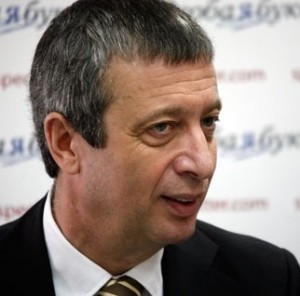Today, Ten Years Ago
On November 25, 2013, the Khodorkovsky Press Centre recalled the events that happened at the start of the Yukos affair. On the same date in 2003, the Yukos case was just emerging and Russia’s Prosecutor-General’s Office had already completed the preliminary investigation into the first criminal case against Mikhail Khodorkovsky.
Below is an interview with Mikhail Khodorkovsky’s lawyer, Vadim Klyuvgant, conducted a decade ago:
Mikhail Khodorkovsky was arrested on 25 October 2003, and on 25 November 2003 the GPO reported that the preliminary investigation into the criminal case had been completed. What does the fact that the investigation into such a complicated case was completed just a month after Khodorkovsky’s arrest tell us?
In my view, only that everything had already been “investigated” secretly and that the aim was to present the “suspect” not as someone who could participate fully in his own defence but as the object of a public lynching. In other words, to present the case as a fait accompli and deprive him of an opportunity to defend himself. This way of operating would also conveniently remove any impediment to using falsified charges. Now, this method has become wide-spread.
Something similar happened to the second case as well, did it not? Khodorkovsky and Lebedev were originally charged on 5 February 2007 in Chita, and on 16 February it was announced to them that the investigative had already been completed (however even after 16 February investigators continued to introduce new material into the case investigation which had allegedly already been completed, and on 30 June 2008 a “new charge” of theft of the entire oil was brought against Khodorkovsky and Lebedev).
This is exactly what I’m saying: it is very convenient for them to operate in that way, and by the time of the second charges, it had already become custom and practice. By the way, vague hints about the possibility of second charges started, if I am not mistaken, in 2004, – even prior to the first trial and verdict. But the “count” mentioned then – something about Open Russia – later disappeared without a trace in what we might call the investigative Bermuda triangle! We tried to find some information, filed requests, motions – with no result. “Bermudas”…
Was such a Stakhkanovite speed of work by the investigators typical practice at that time, or did the “Yukos case” become some sort of test bed for the law enforcers in that aspect as well?
I am sure that in this case it was done on such a scale for the first time. Now it is standard practice.
Many people who believe the second Khodorkovsky-Lebedev trial to be the triumph of the absurd, Kafkaeskness and totally arbitrary, nevertheless prefer to choose less dramatic words to describe the first trial. That is to say, the charges in the first case and the Meshchansky Court itself are viewed as more legitimate in their eyes than the second case in the Khamovnichesky Court. What would you say to the proponents of such a view?
I would advise them to look beyond the stereotypes, which means reading the source materials (the prosecution material and the defence position are in the public domain) and checking them against the law as it stood at the time. Of course one should pay taxes, but taxes that were lawfully imposed at the time, not the invented ones that were applied retrospectively. That is the essence of the tax charges in the first case. Moreover, the authorities banked on the propaganda impact that claims against rich individuals about taxes and privatization would not be subjected to proper scrutiny and that few people would really try to understand their substance. And that is exactly what happened.




